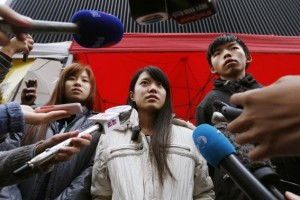
(Reuters) – Hong Kong students vowed to stay put at protest sites in key parts of the Asia financial center on Wednesday in their demand for electoral reforms, defying calls by leaders of the civil disobedience movement Occupy Central for them to retreat.
Hundreds remained at the main protest site of Admiralty, next to government headquarters and the Central business district, determined to continue their fight for free elections for the Chinese-controlled city’s next leader in 2017.
The founders of Occupy Central on Tuesday urged the protesters to go home amid fears of violence, just hours after a student leader had called on supporters to regroup.
“I think that announcement was quite nonsense because as I said, we have been through a lot, and I don’t think that we should pack up our things and leave now,” said 18-year-old student Lorraine Lam.
The protesters are united in their calls for full democracy for the former British colony but are split over tactics, two months after the demonstrations began, in the absence of clear leadership.
The call by Occupy leaders came a day after violent clashes between police and protesters in Admiralty after activists escalated their actions and tried to ring government headquarters.
Police charged the protesters, raining truncheon blows and jets of pava – an “incapacitant spray” – at protesters. Scores of activists and police were wounded.
Occupy leaders Benny Tai, Chan Kin-man and Reverend Chu Yiu-ming plan to surrender to police on Wednesday for their role in gatherings labeled illegal by the government.
Authorities cleared protesters from the working-class district of Mong Kok across the harbor last week, triggering running battles as students tried to regroup.
A small group remains camped out in the busy shopping district of Causeway Bay, but the bulk are in Admiralty, two stops to the west on the Hong Kong island subway, where students have erected a makeshift village.
Hong Kong returned to Chinese Communist Party rule in 1997 under a “one country, two systems” formula that gave it some autonomy from the mainland and a promise of eventual universal suffrage.
But Beijing has insisted on screening any candidates for city leader first.
(Reporting By Jospeh Campbell and Clare Jim; Writing by Anne Marie Roantree; Editing by Nick Macfie)







